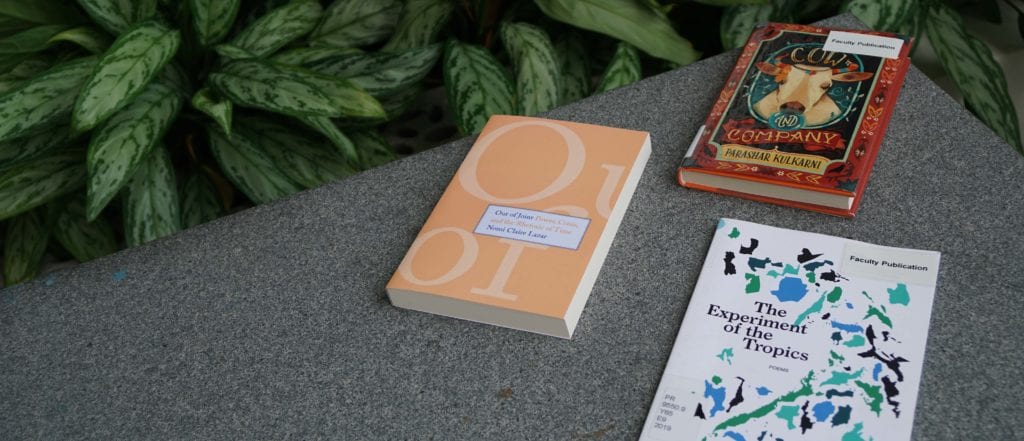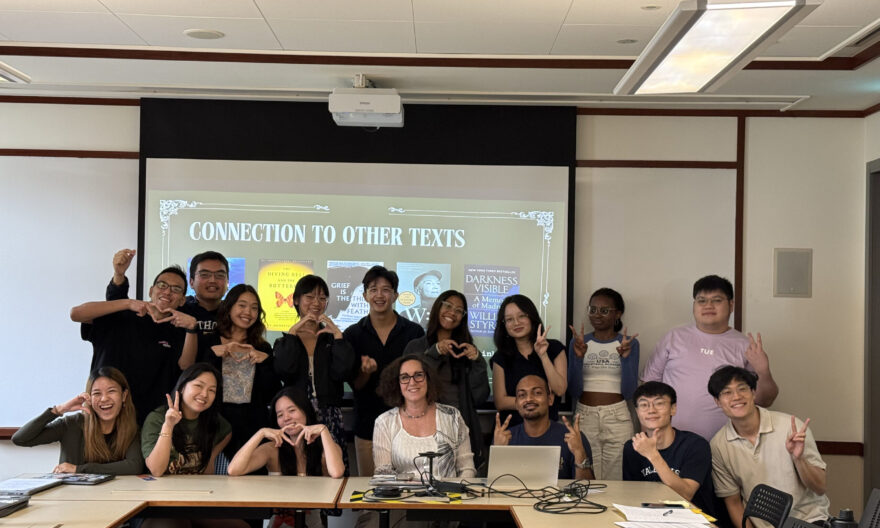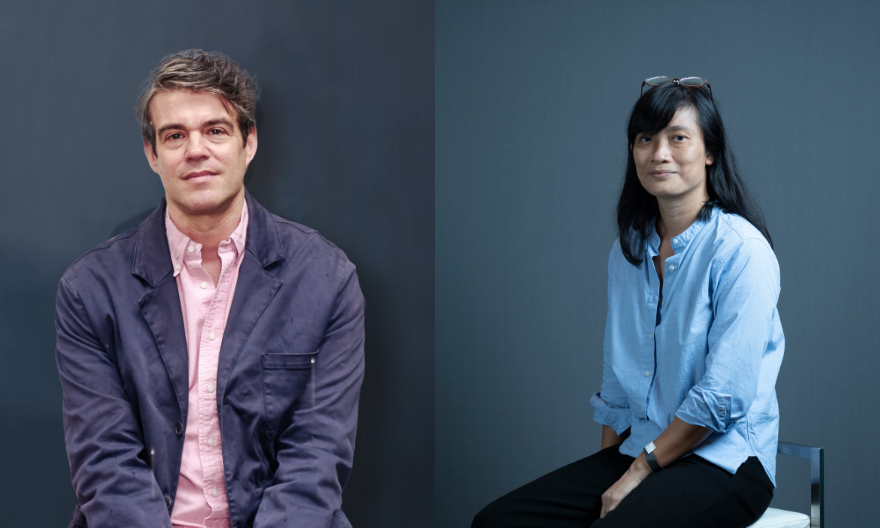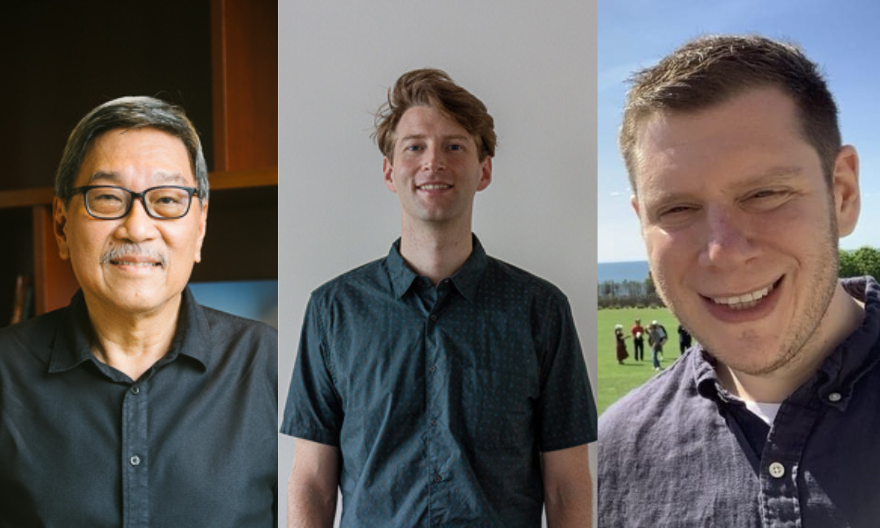Yale-NUS faculty take part in Singapore Writers’ Festival
 Clockwise from left: Out of Joint: Power Crisis and the Rhetoric of Time by Associate Professor of Social Sciences Nomi Claire Lazar, Cow and Company by Assistant Professor of Social Sciences Parashar Kulkarni, and The Experiment of the Tropics by Lecturer of Humanities Lawrence Ypil. Image by Charmaine Chua for Yale-NUS College.
Clockwise from left: Out of Joint: Power Crisis and the Rhetoric of Time by Associate Professor of Social Sciences Nomi Claire Lazar, Cow and Company by Assistant Professor of Social Sciences Parashar Kulkarni, and The Experiment of the Tropics by Lecturer of Humanities Lawrence Ypil. Image by Charmaine Chua for Yale-NUS College.
Three Yale-NUS faculty members, all of whom have recently published books, took part in the Singapore Writers’ Festival (SWF) last month, as speakers and moderators, to share their insights on writing with the public. The festival, which ran from 1 – 10 November 2019, is an annual celebration of global literary talents organised by the National Arts Council of Singapore.
Assistant Professor of Social Sciences (Political Science) Parashar Kulkarni published his debut novel, Cow and Company, which follows the decline and fall of the British Chewing Gum Company due to a riot sparked by a cow. The novel initially began as a short story, which won the 2016 Commonwealth Short Story Prize.
Asst Prof Kulkarni’s research examines the link between religion and politics, particularly in India. Having taught classes such as Contemporary Political Humour and Gurus in Hinduism, he sees his research, teaching, and writing as intertwined. He described creative writing as another tool for presenting his scholarly work.
“Not all research is best represented as articles or academic texts. Some do better as creative non-fiction. Some need to be more speculative, and they transcend to fiction,” he said.
Asst Prof Kulkarni was part of the dialogue session “In All Seriousness” on 3 Nov 2019, which discussed the role of humour in writing about serious issues. He also moderated a session titled “Fiction for the Ignored” on the same day, featuring writers who depict the struggles of the marginalised in society.
For Associate Dean of Faculty (Curriculum) Nomi Claire Lazar, who is also Associate Professor of Social Sciences (Politics), writing has been a means to explore the intersection between her scholarly interests and her personal passions.
Her new book, Out of Joint: Power Crisis and the Rhetoric of Time, explores the relationship of clocks and calendars to politics. According to Assoc Prof Lazar, the idea for the book came from the intersection of her work as a political scientist with an interest in clocks she has had since childhood.
Assoc Prof Lazar spoke on the panel “The Dark Side of Language” on 3 Nov 2019, which dealt with how language is often manipulated as a means of political control. To her, the greatest benefit of taking part in the festival was the opportunity to engage with diverse perspectives from outside academia.
“Scholars spend a lot of time talking to other scholars. We sometimes get stuck in frameworks and theories that come as natural as breath, and we get in the habit of speaking only amongst ourselves,” she said.
“It shook things up in a good way to engage on one panel with a novelist and a journalist about the fraught issues of censorship and hate propaganda.”
Also participating in the festival was practising poet and Lecturer of Humanities (Writing) Lawrence Lacambra Ypil. His latest collection of poems, Experiment of the Tropics, explores the period when the Philippines was under American colonialism through the lenses of history and photography.
Mr Ypil spoke on two panels: “The Creative Writing Classroom”, a discussion of creative writing pedagogy, and “You Spin Me Right Round”, which explored the nostalgia for the 80s in contemporary writing. He also moderated a panel called “When the World Needs Poetry”, which he described as “a panel of poets exploring the relevance and power of poetry in the contemporary world.”
As a teacher of creative writing, Mr Ypil said that he greatly enjoyed the opportunity to engage with other writers and educators during the festival on the subject of pedagogy:
“‘The Creative Writing Classroom’ was such an enjoyable panel. A room full of, I suspect, teachers! A wonderful opportunity to compare notes with Singaporean playwrights on the ways in which the classroom becomes a space of experimentation, transformation, and generosity.”
While all three faculty members came to writing from very different backgrounds and with different research interests, Assoc Prof Lazar suggested that being a writer is a natural progression for an academic.
“All scholars are also writers, even though most of us don’t think of ourselves that way. Writing is, after all, the main conduit for sharing our ideas and research findings with colleagues, students, and the world at large,” she said.




